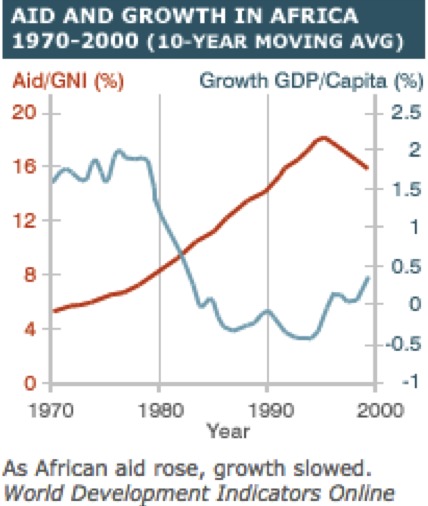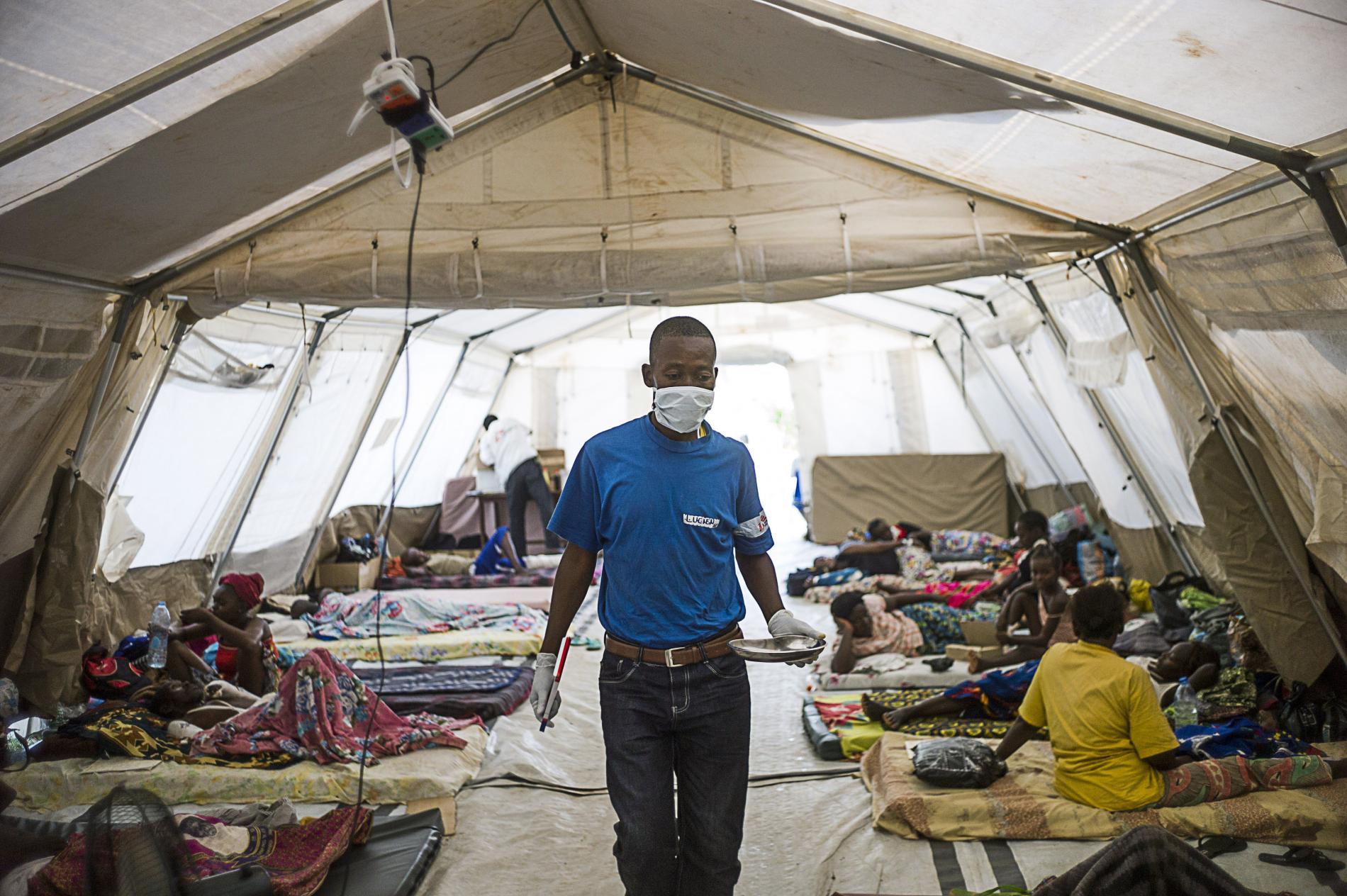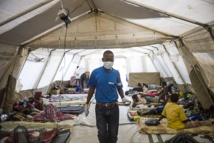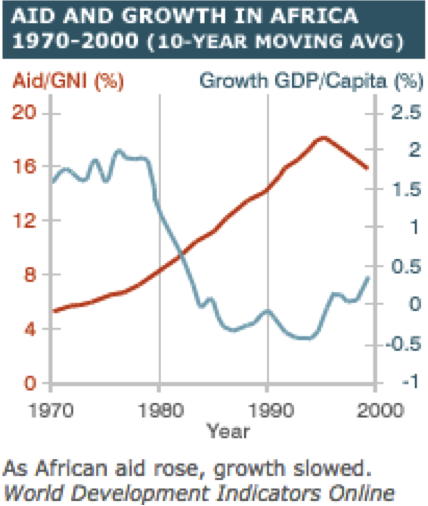There is an unmistakable moral imperative for humanitarian organisations to get involved in crisis situations like the Tsunami or Haiti. This type of aid is efficient in lessening immediate suffering; however it is not the solution in the long-run and does not help provide a stable platform for these countries to sustainably develop. It may have been a success with the US’s Marshall Plan in the late 1940s but more recent foreign aid efforts have been found to hinder development where it is indispensable, and they involve so much more money than was needed to rebuild Europe after World War 2…
So, richer governments are judged by it and famous faces don’t stop campaigning in plead for it but foreign aid doesn’t seem to be showing any significant progress to alleviate poverty, in African countries at least, and in Sub-Saharan Africa more particularly: home to the largest portion on the world’s “bottom million” in extreme poverty. Since the 1950s traditional development economics has been dominated by the idea that large donations is the solution to the savings gap in developing countries but evidence shows that large influxes of foreign aid can end up doing more harm than good.
An analysis of the economic growth in Asia over the past decades, which has received little foreign aid in comparison to Africa, is a good starting point. Reports from the World Bank show that out of the 700 million people who were pulled out of poverty between 1981 and 2010, 627 million of them were in China. That leaves us with 73 million throughout the rest of the world. In other words, 89.6% were from China, giving us a clear indication that foreign aid isn’t the answer. Like Jeffrey Sachs , I thought that foreign aid was the way forward when it comes to eliminating extreme poverty but since the 2000s the “big push” theory has been subject to heated debate highlighting the negative consequences of aid which seem to have left developing countries in a worse place than before. Here is why and here is how changes can be made to see real progress.
Let’s focus on Sub-Saharan Africa. We hear about all these efforts but when we take a look at the statistics of foreign aid budgets to Chad, Angola or Nigeria , the level of progress suddenly appears to be very low in comparison to the huge sums received. The continent as a whole receives roughly $50 billion of international assistance annually. Yet, instead of drastically improving the living conditions of the 600 million people who live below the poverty line, this aid makes the rich richer, the poor poorer and hinders economic growth in the region, not to mention catalysing the vicious cycle of corruption.

Official Development Aid (ODA) is the official financing that is distributed among developing countries with the aim of promoting economic development and welfare in these countries. The money that floods into Africa comes not only from individual government-to-government aid programs but also international development programs such as the World Bank and the IMF, which act as a channelling intermediate between the donor governments and receiving governments.
Foreign Aid is Synonymous With Promotion of Corruption and Dependence
Aid strengthens corruption in countries where it is already widespread. Unfortunately this is the case for many of the countries that make up Sub-Saharan Africa. The largest recipients of foreign aid are in Sub-Saharan Africa, which happens to be where the world’s lowest ranked countries in many areas of governance are, especially in terms of corruption, according to Transparency International. This shows that foreign aid simply reinforces the amount of resources available to already corrupt specific elite groups of people, thus tipping or keeping the balance of power into the hands of the executive branch of government. There is a clear correlation between increased aid and statistically significant increase in corruption.
The money is not distributed evenly among the population or used to promote growth and to help the poor but is instead used on military equipment, white elephant projects, dishonest procurements, etc. It is also used by leaders who are short of time with policies and want to achieve them quickly, i.e. : increasing the size of the government with civil servants (who don’t necessarily contribute anything more to the system or development) to cut down the unemployment rate.
Another consequence is aid dependence. These countries have become used to receiving such large sums of money that they don’t promote local business because they have “free” money at their disposal instead. This prevents any form of improvement in terms of human development and per capita income.
So why are we still giving?
It ultimately makes our politicians look like they all look out for each other and care about each other. The political and strategic interests of the donors dictate the aid giving process more than concerns of good governance in the recipient nations.
This makes African countries look like a helpless civilisation led by corrupt kleptomaniac elites. Colonial history also plays a huge role in the foreign aid process. France tends to gives a lot to its former colonies as a consequence of guilt of the past. Australia and Nordic countries have a tendency to discriminate, or unlike France and the UK they “can” choose to give only to the less corrupt countries because they have no colonial legacies thus freeing them from political pressures.
This makes African countries look like a helpless civilisation led by corrupt kleptomaniac elites. Colonial history also plays a huge role in the foreign aid process. France tends to gives a lot to its former colonies as a consequence of guilt of the past. Australia and Nordic countries have a tendency to discriminate, or unlike France and the UK they “can” choose to give only to the less corrupt countries because they have no colonial legacies thus freeing them from political pressures.
Remember when the EEC (now EU) discriminated against the dictatorships of Spain, Greece and Portugal prior to their membership; only allowing them entry to the Union once they had democratised ? Well, perhaps the IMF and World Bank should do something similar because at the moment they don’t discriminate against corrupt recipients, financially speaking.
Can economic growth in the region be steered back into the right direction ?
If foreign aid isn’t working then it needs to be reconstructed; if global actors can’t help then they must at least not make things worse. New policies and incentives can be put together to show progress rather than failure. Aid needs to be converted into trade.
Capabilities of the citizens of the continent need to be created so that they become creators of wealth and creators of enterprise; so that they can live from their own activities. Thorough and complete policy and decent economic management matter more than foreign aid for developing countries. Stable and strong institutions avoid aid from becoming a curse. There should be more assistance in improving governance before financial assistance because without a strong government, the financial assistance will not fulfil its desired goal.






























